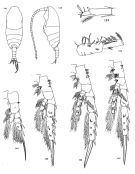|
|
 |
Fiche d'espèce de Copépode |
|
|
Calanoida ( Ordre ) |
|
|
|
Spinocalanoidea ( Superfamille ) |
|
|
|
Spinocalanidae ( Famille ) |
|
|
|
Spinocalanus ( Genre ) |
|
|
| |
Spinocalanus terranovae Damkaer, 1975 (F,M) | |
| | | | | | | Syn.: | Spinocalanus abyssalis : Farran, 1929 (part., p.227: large forms: F: 2,06-1,8); Bradford, 1971 b (part., p.17) | | | | Ref.: | | | Damkaer, 1975 (p.60, 62, Descr.F,M, figs.F, Rem.); Mazzocchi & al., 1995 (p.209: Rem.); Lapernat, 1999 (p.28, 42, 55); Park & Ferrari, 2009 (p.143, Table 3, Appendix 1, biogeography from Southern Ocean); Bode & al., 2017 (p.600, Table I, fig. 2, 3, 4, morphology vs genetic). |  issued from : D.M. Damkaer in NOAA Technical Report NMFS CIRC-391, Seattle, 1975. [p.61, Fig.141-147; p.63, Fig.159]. Female: 141, habitus (dorsal); 142, idem (left lateral side); 143, basipod segments 1 and 2 of Mxp; 144, P1; 145, P2; 146, P3; 147, P4; 159, terminal segments of A1.
|
 Issued from : M. Bode, S. Laakmann, P. Kaiser, W. Hagen, H. Auel & A. Cornils in J. Plankton Res., 2017, 39 (4). [p.605, Table I]. Species identified via morphological and molecular analyses, including the number of specimens used for each identification method (MI: morphological identification, COI: cytochrome c oxydase subunit I gene fragment, MS: MALDI-TOF analysis, 18 S: ribosomal 18 S gene fragment). Cryptic lineages were revealed only after molecular analysis. Sampling depth, latitude, total length (TL) and Prosome/Urosome ratio (Pr:Ur) of taxon were recorded. morphological characters are only listed here, if the identification was ambiguous due to missing body parts or if cryptic or pseudocryptic lineages were revealed during molecular analyses. For diagnostic character of species refer to the references: Park, 1970; Grice, 1971; Damkaer, 1975; Schulz, 1989, 1996. C = coxa; B = basis; P = swimming legs.
| | | | | Ref. compl.: | | | Ward & al., 1995 (p.195, Table 2); Razouls & al., 2000 (p.343, Appendix); Lapernat & Razouls, 2002 (p.17, tab.1); Zenetos & al., 2005 (p.63, Rem.: p.82, casual occurrence); Schnack-Schiel & al., 2008 (p.1046: Tab.2); Zenetos & al., 2010 (p.397); Michels & al., 2012 (p.369, Table 1, occurrence frequency);Evans & al., 2015 (p.225, alien species) | | | | NZ: | 4 | | |
|
Carte de distribution de Spinocalanus terranovae par zones géographiques
|
| | | | | | | | | | Loc: | | | Antarct. (W Weddell Sea, S & SW Atlant., SW Pacif.), sub-Antarct. (South Georgia, SE Pacif.), ? Straits of Magellan, SE Atlant. (25°S, 10°E), Medit. (off Malta) | | | | N: | 12 | | | | Lg.: | | | (13) F: 2,2-1,7; M: 1,9-1,7; (340) F: 1,5; (1252) F: 1,80-1,82; {F: 1,50-2,20; M: 1,70-1,90}
(1252) F: Pr/Ur = 3,3-3,6. | | | | Rem.: | méso-bathypélagique, (off Malte: 2000 m ).
Sampling depth (Antarct., sub-Antarct.) : 0-1700 m.
Signalé comme des grandes formes de Spinocalanus abyssalis par Farran, 1929 (p.227); Vervoort, 1951 (p.70); 1957 (p.40); Tanaka, 1960 (p.36).
La présence de cette espèce en Méditerranée est étonnante, mais conforme à celle du descripteur. Un tel cas a été noté ultérieurement concernant Ctenocalanus citer dans le nord du bassin Levantin (Uysal & al., 2002).
Voir aussi les remarques en anglais | | | Dernière mise à jour : 25/03/2020 | |
|
|
 Toute utilisation de ce site pour une publication sera mentionnée avec la référence suivante : Toute utilisation de ce site pour une publication sera mentionnée avec la référence suivante :
Razouls C., Desreumaux N., Kouwenberg J. et de Bovée F., 2005-2026. - Biodiversité des Copépodes planctoniques marins (morphologie, répartition géographique et données biologiques). Sorbonne Université, CNRS. Disponible sur http://copepodes.obs-banyuls.fr [Accédé le 04 mars 2026] © copyright 2005-2026 Sorbonne Université, CNRS
|
|
 |
 |




